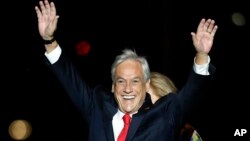Billionaire conservative Sebastian Pinera will begin a second term as Chile's president in March with a strong mandate after trouncing his center-left opponent in Sunday's election, and local markets soared on hopes of more investor-friendly policies.
Still, Pinera will face a divided Congress and an upstart leftist coalition that has promised to fight his plans to lower taxes and “refine” the progressive policies undertaken by outgoing center-left President Michelle Bachelet. Pinera's previous stint as president, from 2010 to 2014, was marked by huge student protests.
Speaking to reporters after meeting with Bachelet on Monday, Pinera struck a tone of unity, saying he would work to form a “broad cabinet, of continuity and change.”
Chile's peso strengthened more than 2 percentage points against the dollar on Monday, while the IPSA stock index hit an all-time high and was up nearly 7 percent, as investors bet on more business-friendly policies under a Pinera administration.
Chile is the world’s top copper producer and the country’s vast mining industry is also counting on Pinera’s support. The business magnate has promised to cut red tape and has pledged support and stable funding for state-run miner Codelco, saying the company is “reinventing itself” and needs investment.
“Codelco needs strong management and must improve its efficiency,” he told reporters.
With his nine-percentage point win over center-left senator Alejandro Guillier in Sunday’s runoff presidential election, Pinera, 68, won more votes than any presidential candidate since Chile’s return to democracy in 1990.
It was the biggest ever loss for the center-left coalition that has dominated Chile’s politics since the end of Augusto Pinochet’s dictatorship. Other South American countries including Argentina, Peru and Brazil have also shifted to the political right in recent years.
The results of a first round vote and a congressional election last month pointed to a more divided country, however.
Far-left candidate Beatriz Sanchez captured 20 percent of votes, nearly as many as the more moderate Guillier, suggesting some dissatisfaction with Chile's long-standing free-market model.
Guillier on Sunday acknowledged the “harsh defeat” and urged his supporters to defend Bachelet’s progressive policies, which have included overhauls of tax, labor and education laws in an effort to fight persistent inequality in one of South America's most developed economies.
Changes to constitution
Pinera said Bachelet had confirmed she plans to present parliament with a bill to recast Chile's dictatorship-era constitution before her term ends in March.
Such a change was also a key campaign promise of Guillier.
Pinera said he agreed on “perfecting it (the constitution) but in a climate of unity.”
Pinera’s Chile Vamos party has 72 of 155 representatives in the lower house, more than any other bloc. Still, without an outright majority in either chamber of the legislature, Pinera’s supporters will have to form alliances to pass most laws.
Sanchez’s coalition earned its first senate seat and around 20 seats in the lower house in November’s election.
“The Frente Amplio commits to continuing to work for a changing Chile, with more rights and more democracy,” she wrote in a tweet congratulating Pinera, referring to the leftist Broad Front party.
Efforts by Pinera's ideological allies in Brazil and Argentina to reduce fiscal deficits by cutting spending and reforming pension systems have faced political opposition and sparked protests in recent months.
“What I think he’s going to do is perfect Bachelet’s reforms, make them more effective, more efficient, maybe help out business a little bit more," said analyst Kenneth Bunker, of political research group Tresquintos.
“But he’ll be cutting around the edges, he’s not going to have power in Congress to do everything he would otherwise.”
Pinera has sought to strike a conciliatory tone.
In a speech at his home following his meeting with Bachelet, he said, “Yesterday Chileans handed us a great victory. But I will be the president of all the Chileans, both those who voted for me and those who voted for Alejandro Guillier.”






